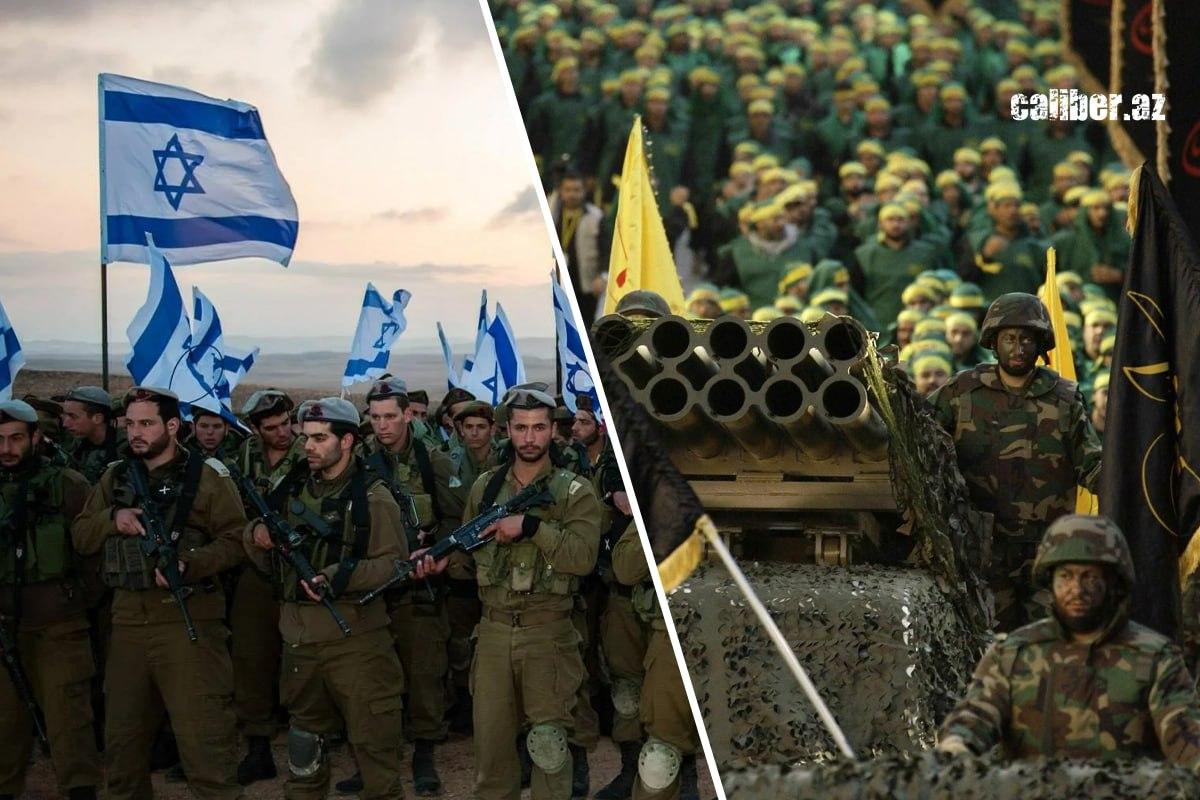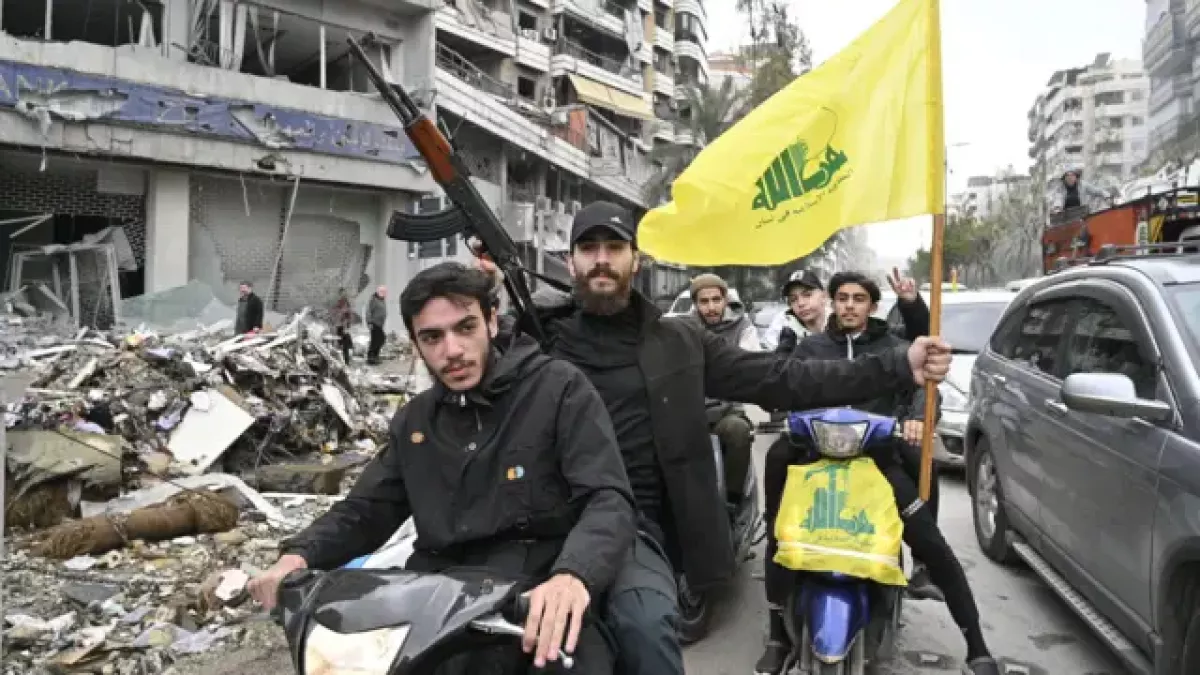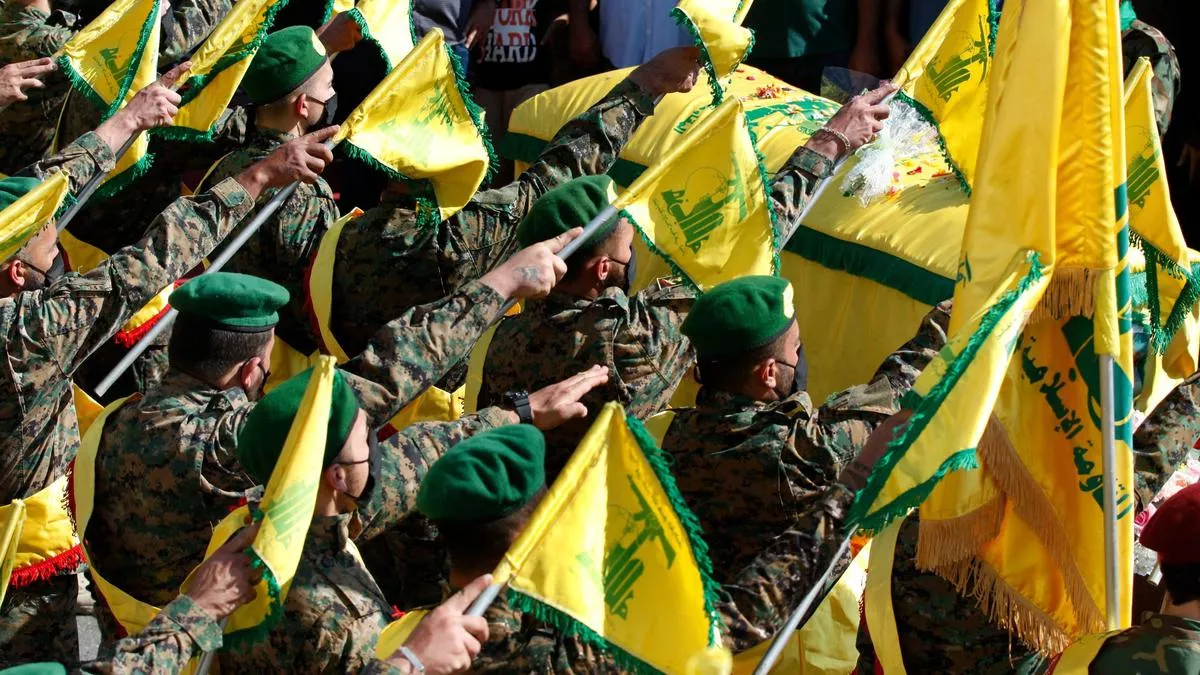Lebanon and future of Hezbollah Will the group ever disarm?
In Lebanon, discussions are underway within the country's leadership about disarming the influential group Hezbollah. However, this seems unlikely. Hezbollah has proven too weak to defeat Israel, but still strong enough to prevent the Lebanese government from disarming it.
Chinese leader Mao Zedong was fond of repeating that power flows from the barrel of a gun. This view was challenged in 1953 when workers in Shanghai organised strikes, as their elected self-management committees refused to hand over factories to the state. Despite the powerful strike having a paralysing effect on the economy, the final word remained with Mao, who used the military to disperse the workers. They had no weapons.
Today, several ministers in the Lebanese government are pushing to establish a timetable for the disarmament of Hezbollah. This was announced by Kamal Shehadi, a minister affiliated with the anti-Hezbollah party Lebanese Forces. Shehadi told Reuters that the disarmament process should take no more than six months. According to him, the proposed timetable, which would set deadlines for the process, is the “only way to protect our fellow citizens from the recurring attacks that are costing lives, costing the economy and causing destruction.” He added that he and other ministers hope the full cabinet will endorse the idea and instruct the defence minister to prepare the schedule. But this vision is unlikely to be implemented.
Why has Lebanon long been in Hezbollah’s hands?
For decades, the Shiite pro-Iranian party Hezbollah has effectively controlled Lebanon. The main reason lies in its possession of the most powerful armed forces in the country—outmatching the Lebanese army and various rival ethnosectarian militias. Hezbollah maintained an active force of 20,000–30,000 fighters, with a similarly sized reserve. Among them were experienced, well-trained units that had seen combat against Israel and participated in Syria’s 13-year civil war.
With its own artillery, armoured units, and special forces, the group evolved into a fully-fledged army—disciplined and battle-hardened—though its core remained rooted in guerrilla forces trained in reconnaissance and sabotage missions against Israel.

Receiving up to $800 million annually from Iran, the party built its own business empire, encompassing a vast production and trade network. This ranged from control over currency exchange points to ownership of construction companies and supermarkets. Hezbollah even operated taxi services and built free or low-cost schools and hospitals for the Shiite population—measures that helped secure the community’s loyalty.
Fragmented and torn by ethnosectarian divisions, the poorly trained Lebanese army was—and still is—no match for Hezbollah. Exploiting its dominant position, the group managed to bring several Lebanese state institutions and security services under its influence, including the General Directorate of General Security (GDGS)—Lebanon’s main intelligence agency—which for years was led by General Abbas Ibrahim, a close Hezbollah ally.
In addition, Hezbollah forged an alliance with the other major Shiite party, Amal, and with the prominent Christian party, the Free Patriotic Movement (FPM). As Israeli analysts have observed, even without full control of the government, Hezbollah effectively ruled Lebanon—or at the very least, held a controlling stake in its power structure, as Israeli expert Jonathan Spyer put it. Even former Prime Minister Najib Mikati, a Sunni and one of the country’s wealthiest men, was considered a Hezbollah appointee.
As a major private corporation involved in international business, Hezbollah generated billions of dollars on its own—revenue that enabled it to maintain a powerful military force and an extensive social support network for its loyal Shiite population. This included schools, hospitals, and supermarkets offering discounted Iranian goods. At the same time, as Iran’s most important proxy in the region, Hezbollah also received substantial funding and weaponry from Tehran.
With access to vast financial resources and stockpiles of modern arms, Hezbollah was capable of engaging in cross-border skirmishes with Israel and hiring large numbers of fighters. In a country as impoverished as Lebanon, not only Shiites but also individuals from other communities joined its ranks. When homes in Shiite villages were struck by Israeli attacks or shelling, Hezbollah’s construction companies—supported by Iranian aid—rebuilt them.
The decline of Hezbollah’s power
Today, the situation appears to be turning decisively against Hezbollah, steadily eroding the group’s former strength.
First and foremost, Hezbollah suffered devastating losses in its confrontation with the Israeli military during the 2023–2024 hostilities. Although the group’s fighters were able to halt—or at least significantly slow—Israel’s advance in the mountainous terrain of southern Lebanon, the military and political leadership of the organisation, including its Secretary-General Hassan Nasrallah, was wiped out. The command structure of Hezbollah’s armed forces was dismantled, and thousands of rank-and-file fighters were either killed or seriously wounded. Particularly devastating was Israel’s pager-guided attack, which reportedly inflicted heavy casualties on the group’s forces.
Secondly—and perhaps most crucially—Syria, which had long served as the main transit hub for Iranian weapons, ammunition, and other aid destined for Hezbollah, fell into the hands of HTS, a Sunni militant group hostile to Iran. On 8 December 2024, after 11 days of fierce fighting, HTS forces captured Damascus. This dealt a massive blow to Hezbollah’s logistics, severely undermining both its military and financial capabilities.
Until recently, Hezbollah had been the key military pillar supporting Bashar al-Assad’s regime in Syria and controlled much of the smuggling trade with neighbouring countries. But today, the HTS forces, now in control of Syria, are systematically dismantling the illicit trading networks linked to remnants of the former regime and to Hezbollah. This has even led to border skirmishes between Hezbollah and the remaining forces loyal to the Syrian government. The loss of Syria has thus triggered a dramatic weakening of Hezbollah.
Thirdly, Iran itself is facing a dire situation, grappling with major political and military challenges, while its economy remains in deep crisis. As a result, Tehran is no longer able to support Hezbollah at the scale it once did. This has led to problems such as delayed salary payments for some of the group’s fighters and administrative personnel, as well as reduced funding for the reconstruction of Shiite homes damaged by Israeli strikes. In fact, these issues began to surface some time ago, gradually eroding the organisation’s standing within the Shiite community.
Although Shiites make up 30–40 per cent of Lebanon’s population, Hezbollah no longer holds dominant influence even among them. In the Lebanese parliament, the group controls only 13 out of 128 seats—a reflection of its waning political clout.
Many Shiites—and members of other Lebanese communities—blame Hezbollah for dragging the country into war with Israel in October 2023, following the cross-border raid by Hamas, a key member of the pro-Iranian “Axis of Resistance” and Hezbollah’s ally. Shortly after the Hamas attack, Hezbollah began shelling Israeli territory. In effect, the group lost the war, exposed the population of southern Lebanon to devastating Israeli bombardments, and now finds itself unable to rebuild the homes of affected families.
Even at the time, many voices warned that Hezbollah was pulling Lebanon into a conflict that the majority of its people neither needed nor supported. Today, those concerns seem vindicated.
Meanwhile, Israel retains control over several strategic areas of southern Lebanon near the border and has shown no intention of withdrawing. It continues to carry out intermittent airstrikes in Lebanese territory—strikes to which a weakened Hezbollah responds only minimally.

In many places, the Shiite population still cannot return to the villages they abandoned. So why start a war with such a powerful adversary like Israel in the first place, if you had no real expectation of victory or even gaining any strategic advantage? — ask Lebanon’s Shiites, along with many others. Why did you provoke Israel? Just because your Iranian sponsors gave the order? Then how is this any different from an Iranian occupation, especially when you’ve put the Lebanese people in harm’s way? And in what way is an Iranian occupation better than an Israeli one—particularly when Hezbollah kills its political opponents, like the Shiite intellectual Lokman Slim, who was shot dead after criticising the party?
"Politically, Hezbollah is more isolated than ever," notes Russian researcher Maxim Zhabko. "It took a long time for the group to lose the prestige it had in the mid-2000s, after the Israeli withdrawal from southern Lebanon (2000) and its relative success in the 2006 war (when Israel failed to either destroy or significantly weaken Hezbollah). But step by step, Hezbollah alienated more and more people: the alleged role in the assassination of [former Lebanese Prime Minister] Rafik Hariri (2005) was followed by the use of weapons against supporters of the then-government in May 2008; then it entered the war in Syria on the side of Assad's regime (around 2013), and by the end of 2019, it used violence against peaceful protesters, and later clearly obstructed the investigation into the explosion at the Beirut port on August 4, 2020."
Today, Lebanon has a new government. Out of the 24 ministers, 10 have been appointed by President Michel Aoun (a Christian) and Prime Minister Najib Mikati (a Sunni). These forces are not officially tied to any specific parties. In practice, they are (to varying degrees) pro-Western and/or pro-Saudi. Another 5 positions were given to the Christian party "Lebanese Forces," which takes a strongly anti-Iranian stance and holds the largest Christian faction in parliament. Meanwhile, another Christian party, the SPD, did not receive any positions in the government, moved to the opposition, and even had a falling out with Hezbollah.
However, the two Shiite parties, Hezbollah and Amal, were granted control of the Ministry of Finance. This is highly significant, especially as the country is experiencing a financial crisis, and it indicates the continued strong influence of the group. But now, Hezbollah and its allies no longer have control over the security agencies and no longer hold a blocking third of the ministerial votes, which could have paralysed any government’s functioning.
Thus, the clear weakening of Hezbollah, observed in all aspects, has prompted its opponents to begin or continue discussions about the idea that it would be better for the group to disarm and become a regular political party. They argue that it should participate in political struggles on equal terms, while the state's security forces take care of maintaining order. In the process, parties hostile to Hezbollah dream of ending Iranian influence.
Surprise! Hezbollah will not disarm
Nonetheless, it is unlikely that Hezbollah will disarm. In reality, it faces opponents on all fronts, whether it be Israel, the new Syrian government, or the authorities in Beirut. Disarmament would mean its rapid or gradual physical elimination. Its opponents are unlikely to show mercy to those they have been fighting for decades, regardless of whether they are Syrian HTS fighters or Lebanese Forces.
Hezbollah leader Naim Qassem, in his speech on March 29, stated that his group no longer has an armed presence south of the Litani River and adheres to the ceasefire agreement, while Israel "violates it every day." Israel accused Hezbollah of maintaining military infrastructure in the southern part of the country. Hezbollah placed the responsibility on the Lebanese state to force Israel to withdraw and cease its attacks. Qassem mentioned that there is still time for diplomatic solutions. However, he warned that "the resistance is present and ready" and pointed out that it might resort "to other options" if Israel fails to adhere to the ceasefire agreement.
Recently, an investigation into the explosion at the Beirut port on August 4, 2020, which left thousands of people injured, was resumed in Lebanon. Judge Tarek Bitar intends to hold Hezbollah's leadership accountable, as its forces controlled the port at the time. However, it is hard to believe that Hezbollah would allow its leaders and officials to be arrested by any judge. If it does, it would show its weakness, and then its days would be numbered. In the Middle East, the weak don’t survive long.
Moreover, what forces does the Lebanese government really have at its disposal? Its army remains weak and divided. Hezbollah, despite its losses, possesses tens of thousands of experienced fighters, tank units, and professional special forces, including the "Radwan" unit, capable of carrying out commando-style operations deep behind enemy lines. According to Israeli analysts, the group's military command apparatus is gradually recovering. And what can the Lebanese leadership do to counter them?

This factor is perhaps central to the situation. Even if Hezbollah has become weaker by several times, it doesn’t mean the Lebanese government has the ability to destroy it. It’s unlikely that the government would now risk confronting the Shiite army. It’s no coincidence that President Michel Aoun stated that the issue of Hezbollah's weapons should be resolved through dialogue, as any attempt to disarm the group by force would lead to conflict. Patriarch Bechara Boutros al-Rahi, the head of the Lebanese Maronite Church, recently said that it is time for all weapons to be in the hands of the state, but for this to happen, time and diplomacy are needed, because "Lebanon cannot withstand another war." However, the kind of diplomacy that could force Hezbollah to disarm likely does not exist.
There is another factor to consider. American researcher on Hezbollah, Hanin Ghaddar, points out that the group's influence within the Shiite community may have recently increased. The reason for this is the massacre of the Alawite population, which is closely tied to Shiism, in neighbouring Syria, in the Latakia region. Now, some or many Lebanese Shiites may perceive what is happening as an existential threat to their physical survival, viewing Hezbollah as their natural defender against such a threat.
Finally, surprisingly, Hezbollah at certain moments has defended the entire Lebanese ruling class from the anger of the social underclass. In 2019, 2 million people took to the streets, half of the adult population. The mass protests were directed against the leadership of all Lebanese parties, whom the demonstrators accused of corruption, embezzling the budget, and enriching themselves at the expense of the rest of the population. People from all religious sects participated in this movement, including hundreds of thousands of Shiites. The protesters also demanded free social services, electricity and water supplies, and the creation of jobs. Some groups of demonstrators expressed a desire to replace Lebanon's political system with direct democracy. This movement was met with violence from Hezbollah militants, who helped weaken and disperse it. It is far from certain that Lebanon’s ruling elites have another equally reliable form of protection in the event of a repeat of the 2019 events, which are sometimes referred to as the Second Arab Spring.
In any case, it is unlikely that Hezbollah will disarm in the near future. One might even assume that the group will undertake some demonstrative and essentially insignificant actions, symbolically handing over a couple of hundred rifles to the government. After that, Hezbollah will engage in endless negotiations in the Iranian style, achieving no results except for one. Just as the Iranians have been negotiating with the U.S. over the nuclear deal for years, Hezbollah will demonstrate its readiness to negotiate and cooperate with the government. In other words, it will buy time, rebuild its military strength after the losses it has suffered, and wait for better times to attempt to restore its former influence and control over the country. In the Middle East, the key is knowing how to wait.








